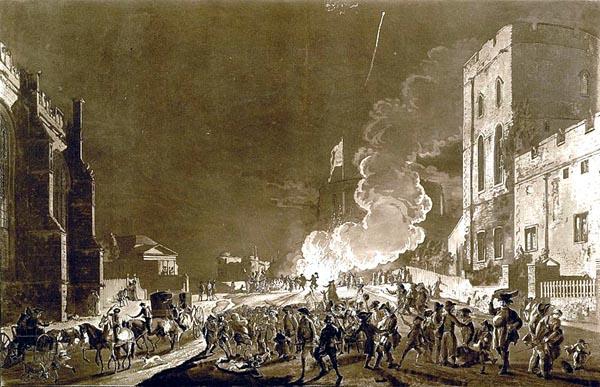 |
| Guy Fawkes Night, 1776 (Wikipedia) |
Note: This celebration has its roots in the arcane rules of succession by which an English king or queen was chosen.
Get Ready: Do you think that "church and state" (religion and government) should be allowed to control one another?
It's not often that a holiday celebrates a failure, but that's exactly the point of Guy Fawkes Night. Its origin lies in the succession rules of the British monarchy, and how they came to affect the nation's religion.
Henry the Eighth was famously unable to father a son to take his place on the throne. He and his first wife, Catherine of Aragon, had a daughter named Mary, as well as several children who either were stillborn or died in infancy. Henry was dissatisfied with Catherine for bearing him no sons, and at the same time he became infatuated with another woman--one of Catherine's "maids of honour"--named Anne Boleyn.
So Henry attempted to get an annulment of the marriage to Catherine, but the Pope--for complex political reasons--refused it. Henry thus broke away from the Catholic Church, and started an independent one, the Church of England, also known as the Anglican Church.
That church survives to this day as the "national church" of England. While the reigning monarch--currently Queen Elizabeth II--is also the "Supreme Governor" of the Church, its spiritual head is the Archbishop of Canterbury, who presides at the coronations of kings and queens. The monarch, in turn, selects the Archbishop.
But Anne, too, bore Henry only one daughter, named Elizabeth, and miscarried two baby boys. Her failure to bear a male heir earned her a beheading on charges of adultery.
At last, his third wife, Jane Seymour, bore Edward, Henry's only son, but Jane died shortly after childbirth. Henry was married three more times--to Anne of Cleves (marriage annulled), Catherine Howard (also beheaded on charges of adultery), and Catherine Parr (who outlived Henry)--but had no further offspring after Edward.
When Henry died, his only son became Edward the Sixth, at the age of nine. But he was a sickly boy, and died when he was only 15. When Edward's half-sister became Mary I, she reverted the country to Catholicism, and persecuted Protestants, earning herself the nickname "Bloody Mary."
Here we will have to leave off our story until Lesson #05-052.
--------Read more: https://en.wikipedia.org/wiki/Guy_Fawkes_Night
Practice: Match the term to its definition below:
- adultery
- annulment
- coronations
- infatuated
- miscarried
- outlived
- persecuted
- reigning monarch
- reverted
- stillborn
- lost a baby before it was born
- crowning ceremonies
- having a relationship when married to another person
- lived past someone else's death
- harassed or oppressed, especially for political or religious beliefs
- foolishly in "love"
- born dead
- changed back
- current king or queen
- invalidation of a marriage (rather than getting a divorce)
Answers are in the first comment below.
Submitted to the Shenzhen Daily for June 6, 2017


Answers to the Practice: 1. c; 2. j; 3. b; 4. f; 5. a; 6. d; 7. e; 8. i; 9. h; 10. g
ReplyDelete